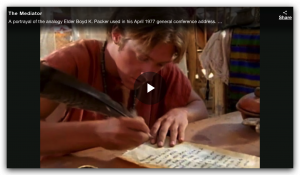Doctrine and Covenants 45
“The Promises … Shall Be Fulfilled”
President Russell M. Nelson taught: “Write the thoughts that come to your mind. Record your feelings and follow through with actions that you are prompted to take” (“Revelation for the Church, Revelation for Our Lives,” Ensign or Liahona, May 2018, 95).
Record Your Impressions
We live in perilous times, and that can be troubling. Even Jesus’s disciples, when they heard Him prophesy of the calamities that would occur in our day, “were troubled” (Doctrine and Covenants 45:34). The early Saints in Kirtland, Ohio, were also troubled by the perilous times in which they lived. Among other things, there were “many false reports … and foolish stories” that were undermining the gospel message (Doctrine and Covenants 45, section heading). But the Lord’s response, then and now, is “be not troubled” (verse 35). Yes, there is wickedness, but there is also evidence that God is hastening His work. Yes, there are perils predicted to precede the Second Coming, and we should be aware of them. But these aren’t just warnings of danger; they are also signs that God’s promises are about to be fulfilled. Perhaps this is why Doctrine and Covenants 45—a revelation that describes many of these signs in detail—was received “to the joy of the Saints” (section heading).

Ideas for Personal Scripture Study
Jesus Christ is our Advocate with the Father.
Have you ever felt inadequate or unworthy before God? You may find reassurance in Doctrine and Covenants 45:1–5. What do words like “advocate” and “pleading” suggest to you? How does the Savior advocate for you, or plead your cause? What does it mean to you to know that Christ is your Advocate?
The following words from President Joseph Fielding Smith could help you ponder these verses: “Jesus [is] our advocate, pleading for us as our mediator through his ministry and labors to reconcile us, to bring us into agreement with God” (in Conference Report, Oct. 1953, 58).
See also 2 Nephi 2:8–9; Mosiah 15:7–9; Moroni 7:27–28; Doctrine and Covenants 29:5; 62:1.
Doctrine and Covenants 45:9–10
The gospel is a standard to the nations.
Anciently, a standard was a banner or flag carried into battle. It rallied and unified soldiers and helped them know where to gather and what to do. A standard is also an example or rule that other things can be measured against. As you read Doctrine and Covenants 45:9–10, ponder how gospel covenants have been a standard for you. How would your life be different if you did not have these covenants?
See also Isaiah 5:26; 11:10–12; Doctrine and Covenants 115:5–6.
Doctrine and Covenants 45:11–75
The Lord’s promises will be fulfilled.
War, iniquity, and desolation will precede the Savior’s Second Coming. But “be not troubled,” the Lord said, “for, when all these things shall come to pass, ye may know that the promises which have been made unto you shall be fulfilled” (Doctrine and Covenants 45:35).
As you study Doctrine and Covenants 45:11–75, consider focusing not just on the troubling events that are prophesied but also on the blessings the Lord promises (for example, the promises in verses 54–59 about the Savior’s millennial reign). You could do this by creating lists or by labeling or marking the verses. What do you find that helps you “be not troubled” about the last days?
Doctrine and Covenants 45:31–32, 56–57
“Stand in holy places,” and be not moved.
One reason the Savior and His prophets teach us about the signs of the Second Coming is to help us prepare. What do you learn in Doctrine and Covenants 45:31–32, 56–57 about preparing for the Lord’s Second Coming? It might be helpful to review the parable of the ten virgins, found in Matthew 25:1–13. The Savior compared the oil in this parable to truth and to the Holy Spirit (see Doctrine and Covenants 45:57). What insights do you gain when you read the parable this way?

Parable of the Ten Virgins, by Dan Burr
Doctrine and Covenants 45:11–15, 66–71
Zion is a place of safety for the Saints of God.
The Saints in Joseph Smith’s time were eager to build Zion, the New Jerusalem, as described in the Book of Mormon (see Ether 13:2–9) and in Joseph Smith’s inspired revision of the Bible (see Moses 7:62–64). What do you learn about Zion—both the ancient city of Enoch’s day and the latter-day city—from Doctrine and Covenants 45:11–15, 66–71?
Today the command to establish Zion refers to establishing God’s kingdom wherever we live—wherever the children of God gather to the safety of His “everlasting covenant” (verse 9). What can you do to help build Zion where you are?
See also Gospel Topics, “Zion,” topics.ChurchofJesusChrist.org.


Ideas for Family Scripture Study and Home Evening
- Doctrine and Covenants 45:3–5.
What does an advocate do for us? You could watch the video “The Mediator” (ChurchofJesusChrist.org) and talk about why the Savior is called our Advocate.
- Doctrine and Covenants 45:9–10.
If your family had a “standard,” or flag, to represent your commitment to the gospel, what would it look like? It might be fun to make a family flag together and discuss how you can help others follow the gospel standards.
- Doctrine and Covenants 45:32.
What are our “holy places”? What does it mean to “not be moved”? How can we make our home a holy place?
- Doctrine and Covenants 45:39–44.
How can you help family members understand what it means to watch for the Savior’s Second Coming? Maybe you could think of an event that you are anticipating and share ways that you are “watching” for that event. Or you could bake something together and watch for signs that it is ready to eat. What are we doing to watch for the Savior’s Second Coming?
- Doctrine and Covenants 45:55.
Reading 1 Nephi 22:26 and Revelation 20:1–3 can help your family understand how Satan “shall be bound” during the Millennium. How can we bind Satan in our lives?
For more ideas for teaching children, see this week’s outline in Come, Follow Me—For Primary.
Suggested song: “When He Comes Again,” Children’s Songbook, 82–83; see also “Ideas to Improve Your Family Scripture Study.”
Improving Personal Study
Use study helps. Use the footnotes, the Topical Guide, the Bible Dictionary, and the Guide to the Scriptures to gain insights into the scriptures.

The Coming of Christ, by Jubal Aviles Saenz

